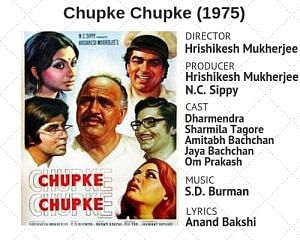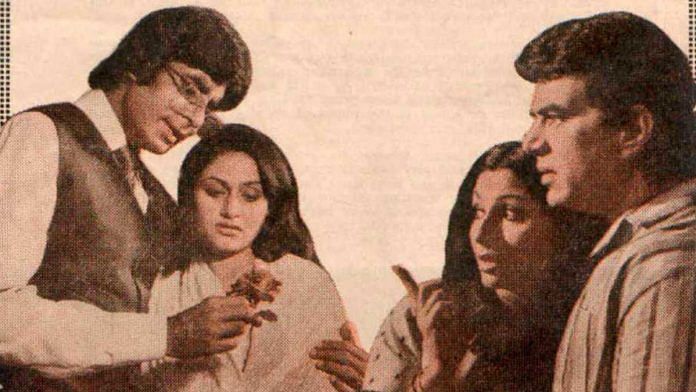Hrishikesh Mukherjee’s Chupke Chupke, set in Allahabad (now Prayagraj), delivers a simple message through hilarious performances.
The year 1975 was remarkable for India. From the imposition of the Emergency to the rise of Amitabh Bachchan to the jaw-dropping success of Jai Santoshi Maa, there was a lot for the people to chew on. One of the minor but pleasant offerings that year, however, was the now-cult movie Chupke Chupke, with some really great performances, especially from Dharmendra, who turned 83 yesterday.
Hrishikesh Mukherjee, the genial ‘middle of the road’ filmmaker, isn’t who you turn to for a lesson in cultural puritanism, Yet, surprisingly, he had plenty to say, about linguistic pride and pollution. At the heart of Chupke Chupke is the battle for the soul of Hindi language. The movie couched it all in a lighthearted story about the ‘nok-jhonk’ between a jija and a sadhu (brother-in-law).
Also read: There is much more to birthday boy Dharmendra than just his ‘He-man’ image
With characters from ‘Illahabad’ (now, unfortunately, Prayagraj), the seat of Hindi literature at the time, Mukherjee offered the sound of ‘shuddh bhasha’ in daily interactions between regular people. And boy did it sound uncomfortable, albeit funny (what else do you expect when Gulzar is credited for dialogue).
 Working with a story by Bengali writer Upendranath Ganguly, Mukherjee had cast Dharmendra against type in the role of an academic — a botany professor no less.
Working with a story by Bengali writer Upendranath Ganguly, Mukherjee had cast Dharmendra against type in the role of an academic — a botany professor no less.
Staying at a guest house in an unnamed hill station, Prof Parimal Tripathi falls in love with Sulekha (Sharmila Tagore), a college student on an excursion. Post a hilarious setup featuring a small ‘chowkidar’ prank, the two quickly get married in Allahabad. A month later, Sulekha gets an invite to visit her beloved Jijaji (Om Prakash), who couldn’t attend her wedding. Parimal, out of envy, thinks of a prank to outdo the almost mythical Jijaji, who can do no wrong.
Outsmarting the Jijaji becomes a tour de force in language wars — a clash not unfamiliar in post-independence India or even now, for that matter.
Jijaji wants a ‘shudh’ Hindi speaking driver from Allahabad, and Parimal decides to drive home his point by taking on the job. And so Jijaji gets Pyaare Mohan Illahabadi, a driver who talks to him on their first meeting in a torturous but unpolluted Hindi:
“Hum loh path gamini agnirath se aaye hain.”
“I’ve arrived by train” is all that the gentleman wants to say.
But Mr Illahabadi shines a light on the minutiae of the Hindi language, the texture of its elegant sound and gargantuan meaning it offers.
Convoluted? You can call Pyaare Mohan the Shashi Tharoor to Jijaji’s India.
Also read: Try watching ‘Satyakam’ in the age of post-truth, fake news and incorruptible leaders
Parimal isn’t done. He racks up the pranks with one little trick after another. He creates the false impression of an affair of his own wife with Pyaare Mohan. He then brings in his bumbling friend from Allahabad, Sukumar Sinha (Amitabh Bachchan), to play Parimal. The faltering Sukumar, in the process, falls in love with Vasudha (Jaya Bhaduri), the sister-in-law of Parimal’s friend Prashant (Asrani). All of this to just to trip up the all-knowing Jijaji.
If you’re surprised to see Bachchan’s name come so late, it’s understandable. Sholay had yet to come out.
Dharmendra had a career that could easily be translated into phases. In the early part of his career, he was the quiet and gentle presence in films like Anupama and Satyakam. He then turned into the ‘He-Man’ who took bandits down in Mera Gaon Mera Desh (or its Salim-Javed version in Sholay). In the 80s, he took to B-movies in a largely forgettable decade. In the last decade, however, he has done some memorable parts, including in Johnny Gaddar.
In Chupke Chupke, he did a role that’s almost peerless in his oeuvre. And he performed it with the dexterity of a comic veteran, even handling the difficult ‘uchcharan’ of words that were alien to his Punjabi roots. He was matched beat for beat by the lovely presence of Sharmila Tagore.
In a four-songs-only soundtrack, S.D. Burman, along with lyricist Anand Bakshi, offered at least two gems in ‘Ab Ke Sajan Sawan Me’ and ‘Sa Re Ga Ma’.
In post-Independence India, Allahabad was home to several Hindi literature giants, including Bachchan’s own father Harivansh Rai. It was seen as the city of sophisticated litterateurs. Mukherjee’s choice to use the city for setting up the characters was inspired, especially in light of the comment he was trying to make.
Language is not just for communication, but also to bring people together, he seemed to say. And he injected humour in it with a certain affection for the language, as well as ownership of it, something that may seem extraordinary in today’s polarised environment.
The movie is ultimately a plea to keep language simple, flexible and open to influences. It not only trips up Jijaji but his puritanism too.
People did take offence even in that era, though. And Gulzar wrote a line to skirt the anticipated sensitivity perfectly. In a scene, ridden by guilt over making fun of his own language, Parimal tells his co-conspirator Haripad Bhaiya (David) that he was feeling cheap about it.
In a pearl of wisdom, Haripad Bhaiya says: “Arre barkhodar, tum bhasha ka mazaak nahi kar rahe ho, ek aadmi ka mazaak kar rahe ho. Bhasha apne aap me itni mahan hoti hai ki uska mazak kiya hi nahi ja sakta. (You’re not making fun of language, you’re making fun of a man. Language is too great in itself to be ridiculed.)”
Also read: With 2019 elections approaching, Gulzar’s Aandhi is the film to watch again



